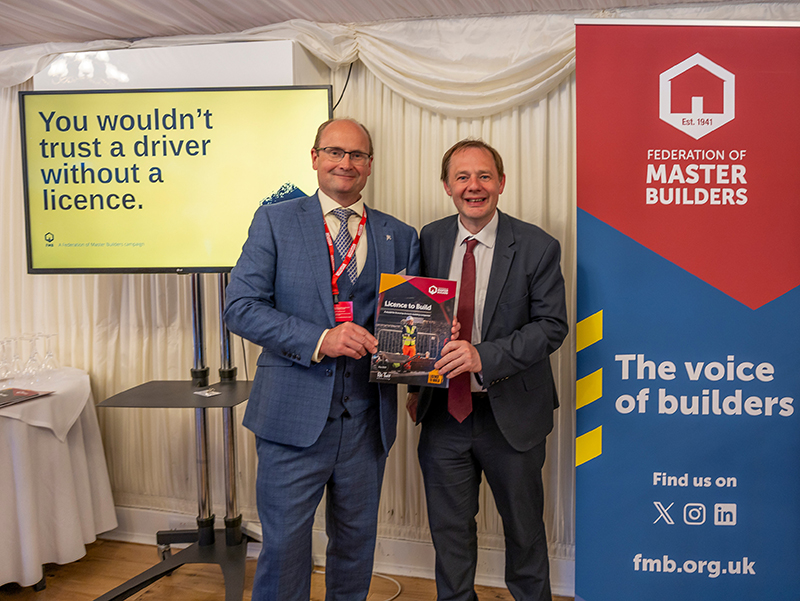
MOMENTUM is growing for a mandatory licensing scheme for building contractors.
The Federation of Master Builders (FMB), which has long campaigned for the introduction of such a measure to protect consumers, create a level playing field, and drive up standards, recently launched its ‘Licence to Build’ model at an event in the House of Lords, which sets out a framework for how a system could potentially operate in practice.
While Scotland has a separate building standards system, FMB Scotland director Gordon Nelson told Project Scotland the campaign for mandatory licensing is equally relevant north of the border, and he sees scope for either a UK-wide system or a Scottish equivalent.
Gordon Nelson cited an FMB survey, in which 86% of members indicated support for some sort of compulsory licensing system for domestic building companies. The issue has taken on extra significance following the publication of the Grenfell Tower Inquiry Phase 2 report, which recommended a licensing scheme, operated by a construction regulator, for principal contractors undertaking work on higher-risk buildings.
Gordon supports this but would like to see it extended to domestic building contractors.
He has engaged on the topic of licensing with MSPs and other key stakeholders in Scotland for many years, and also sits on the Building Standards Futures Board, which looks at ways of improving the performance of the building standards framework.
A discussion on licensing construction was held at the Scottish Parliament last November, in which Gordon delivered a presentation setting out the arguments for it and how it could potentially work.
“It’s obvious that there needs to be dialogue between the UK Government and the Scottish Government as to how a system would be set up and operated,” Gordon told Project Scotland.
He outlined two potential scenarios. One would be a licensing system driven through the consumer protection lens, which is a reserved matter and would allow for legislation to be passed by Westminster and enforced on a UK-wide basis.
“Thereafter how it would function within the building standards system in Scotland would be up to Scotland to some extent,” Gordon added.
If ultimately the UK Government didn’t legislate on licensing through consumer protection, a second option could be to strengthen the system in Scotland to include a form of licensing, albeit through the powers of our building standards system.
“From my perspective, and also talking to members too, it would certainly help to raise the bar of quality and standards,” Gordon added. “I’m quite encouraged that there is good dialogue and a recognition from the Scottish Government that we support the aims and the aspirations in the Grenfell Phase 2 report with recommendation 21, on the licensing of principal contractors being of particular significance for the FMB’s campaign. We’re saying let’s go for that but also think beyond that. Think much wider.”
In terms of how a licensing system would work, the FMB model sets out a framework where the scheme would be funded by the industry via modest annual fees. A single UK licensing authority – or Scottish equivalent – would act as the main point of contact, and firms would apply for a licence via an approved scheme provider. Renewal checks would be built in and failure to adhere could lead to sanctions, up to and including a licence being revoked. Upon application, firms may receive a provisional licence.

“We’d want to see applicants declare that they support best practice in worker wellbeing, community relations, and environmental impact,” Gordon explained.
“We’ve identified four scheme pillars, which would be subject to management and enforcement. They are health and safety, competence, quality management, and disputes.”
Based on calculations the FMB has carried out, Gordon reckons the annual fee for a licence would be around £172.
“The licence would be on the business – the legal trading entity – not the individuals,” he added. “We’re conscious of the fact that we don’t want to lump more costs onto industry. Having it at that level we think would be affordable.”
Recent research commissioned by the FMB in conjunction with the HomeOwners Alliance suggested that just under half of UK adults wrongly believe that builders are already licensed. Gordon said there are assumptions made by homeowners which are ‘misaligned with reality’, which he believes strengthens the argument for licensing.
“There’s a disconnect between the perception of consumers and the reality of how the industry actually operates,” he said. “About a third of adults from the research believe that builders must register with a professional organisation like the FMB or others to show a commitment to quality, standards, and ethical practices.”
The issue of rogue builders continues to undermine the reputation of the industry. Gordon revealed FMB members have reported receiving calls from homeowners who have fallen victim to work that isn’t up to standard and are desperately in need of a reputable builder to come in and correct things.
“Depending on what’s been done, that can be very complex and also very risky,” Gordon stated. “There is an issue for many members of being undercut by the cash-in-hand sector. The vast majority of construction clients – and I include not just domestic clients – are not repeat clients of construction and building companies. They are often completely new to it. In many ways clients don’t know the questions to ask or where to begin, so they can be easily misled and tempted down a false cost-saving route.
“As a homeowner, if you’re investing in the only likely appreciating asset most of us are ever likely to have – your home – you’d want the works to be done safely and to a high standard, and you’d want to be able to pay for a quality service.
“We were recently exhibiting at the Glasgow Homebuilding & Renovating Show and had some members along to give advice to clients about the right way to start and undertake renovation projects and answer technical questions about materials and so forth. It was quite evident from feedback from our members who are the builder experts – and also conversations that delegates had with me on the stand – that there’s still a lot of bad actors out there who are able to mislead consumers and point them in the wrong direction.”
Gordon believes licensing would not only help professionalise the sector but would also make it a more appealing career option for youngsters and individuals looking to transition from other sectors.
The next milestone in the journey towards licensing could happen this month, when a second reading of MP Mark Garnier’s Private Members’ bill on the subject is scheduled for Westminster. The outcome of that will provide an indication of the political appetite and a clearer understanding of what pathways will emerge.
Whatever happens, Gordon is confident about the direction of travel and desire – including within the construction industry – for change.
“Those within the building sector are a lot more positive about making changes and driving culture change than perhaps they’ve been given credit for,” he said. “There are innovative small building contractors around Scotland who are great examples of being a warm, welcoming place to work and a great supportive working environment. The next few years are going to be interesting and exciting for the building industry.”








